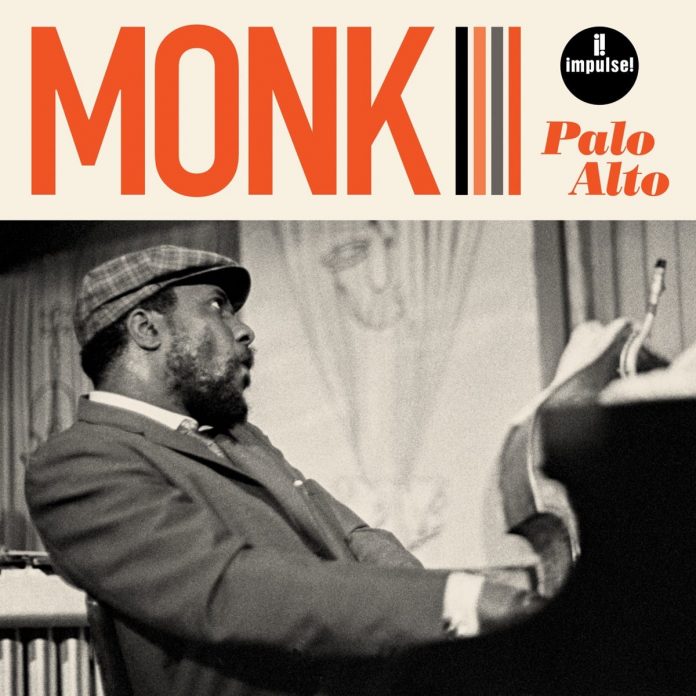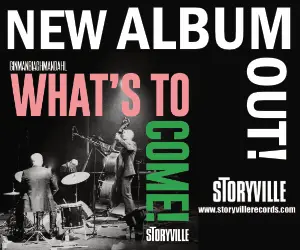Thelonious Monk: Palo Alto (earlier reviewed on CD by Dave Gelly)
Some newly discovered sessions come to light when they are discovered, sometimes by accident, in record company vaults. Some are brought out by musicians on the session who made personal tapes at the time. Rarely can a set by an important jazz musician have come to light from a concert organised by a young student at a high school who loved Monk’s music.
This happened in 1968 when senior student Danny Scher contacted Monk’s agent, signed a preliminary contract then phoned Monk at his San Francisco gig to make sure he was coming. Monk needed money, he owed his record company and had not been working much due to bad health, so any extra gigs were welcome.
Scher arranged for his elder brother to collect him and the band from San Francisco and take him back to his evening gig after the afternoon concert at the high school. After the show Scher paid Monk in cash and resisted attempts by the pianist’s agent, later, who had been less than helpful, to claim a commission fee. He referred the agent to “Mr. Monk.” No wonder he became one of the most successful concert promoters on the West Coast after graduating!
Monk was often accused, along with Charlie Rouse, of coasting through his music during the Columbia years, the tenor man described as gliding over the surface of the music. Many of those accusations have a ring of truth listening to the studio recordings but Monk had a hard time with Columbia Records and he never gave his best when his employers treated him with less than due respect. To prove the point, listen to Monk’s live concert recordings in Japan and in USA at the It Club during the 1960s.
This music is positively enlightening, Monk and Rouse on top form engaging fully with the music and producing fresh and vibrant improvisations on a programme of Monk staples. Ruby My Dear and Straight No Chaser are played with vigour and constant fresh invention. Gales on bass and Riley at the drums provide sterling support with the bassist turning in two of his best solos on record. On Well You Needn’t he is spot on with an arco solo, articulation spotless and then he has a pizzicato work out on Blue Monk, full of double stops and quotes and followed by a striking drum spot from Riley. Monk’s solos fairly bristle with invention and newly minted phrases on the familiar material, keeping the rhythm section on their toes throughout. Blue Monk is the standout track, in fact, running at over 14 minutes, but the time seems to pass by in a flash.
The uproar of applause and stomping at the end sends Monk back to the keyboard for a solo version of I Love You Sweetheart Of All My Dreams by Art and Kay Finch and one Herbert Lowe. Where on earth did Monk find them? At the end he faces the audience and says, “We have to get back now to work, you dig?” At which point Scher’s brother drives the band back to the evening gig at the Jazz Workshop. A final surprise, the concert was recorded by a school janitor who offered to tune the piano in return for being allowed to record the entire concert. It is a particularly good stereo recording, helped on no doubt by remastering and modern technology. No Monk enthusiast should be without this gem.
Impulse 00602507112844, vinyl
Alan Wakeman: The Octet Broadcasts 1969 And 1979 (earlier reviewed on CD by Matthew Wright)
Two BBC Radio broadcasts, separated by 10 years, the 1969 set first heard on Radio 1 in November 1969 and the second in May of 1979 on Radio 3. What the first programme was doing on Radio 1 at 12.30am I cannot imagine. [John Peel’s programme? – Ed.] Frightening the rockers and teeny boppers maybe? In any event I hope they made some sense of it all because it can’t have been easy.
The first album is introduced by Brian Priestley and begins with Dreams, which benefits from a sturdy, extended tenor sax solo from Alan Skidmore. It is free jazz with little in the way of conventional harmony or, for that matter, melody or rhythm. Skidmore’s solo prevents it degenerating into complete chaos. Forever is much more ordered and is based on the standard When I Fall In Love. John Taylor plays a free-flowing piano solo followed by a long alto workout by Mike Osborne.
Side two of the LP is taken up with Merry-Go-Round which has a melody in the middle sandwiched by some wild, free blowing where the saxes scream like animals in torment. One section features the musicians trading their usual instruments for gongs, tambourine, sleigh bells and Chinese gongs. The conventional ensemble, complete with recognisable melody works quite well but the free sessions make the sort of sounds that seem positively dangerous to the ears. The free ensemble is chaotic though, to put it mildly. It is taken from the original broadcast tapes according to the back cover but in mono. For the BBC, In 1969? Curious.
The 1979 octet is introduced by Charles Fox and this was broadcast in May on Radio 3, which sounds more like the right home for all this music. It is, according to Fox, a suite about the invention of chess which, he informs us, appeals to many jazz musicians. Chaturanga is an early word for chess apparently and is distinguished by an interesting, inventive tenor solo by Art Themen. The mood is modal throughout this long track. It also has an intricate, extended arco bass solo by Laurence.
Manhattan Variation is mostly by the octet in ensemble, as is Vienna, which features Wakeman on tenor and some tasty section work. Robatsch Defence reverts to a wild and screaming tenor in duet with Rutherford’s crusty trombone. Mercifully, it only lasts for one minute and 10 seconds. The final Kingside Breakthrough is based on a Bach chorale, played by the octet at the beginning. Alan Skidmore plays a sturdy tenor solo on this one and the octet blow with spirit. This and the modal Chaturanga are the highlights of the session. It was composed and performed originally over two hours, so this is just a scaled down selection. Because these sessions are quite different and separated by 10 years, I have rated each LP individually. The mastering and cutting of the LPs lives up to Gearbox’s high standards providing clean, clear sound throughout.
Gearbox 1562, vinyl
Full discographies for both the above titles are in the original reviews, linked above.

















